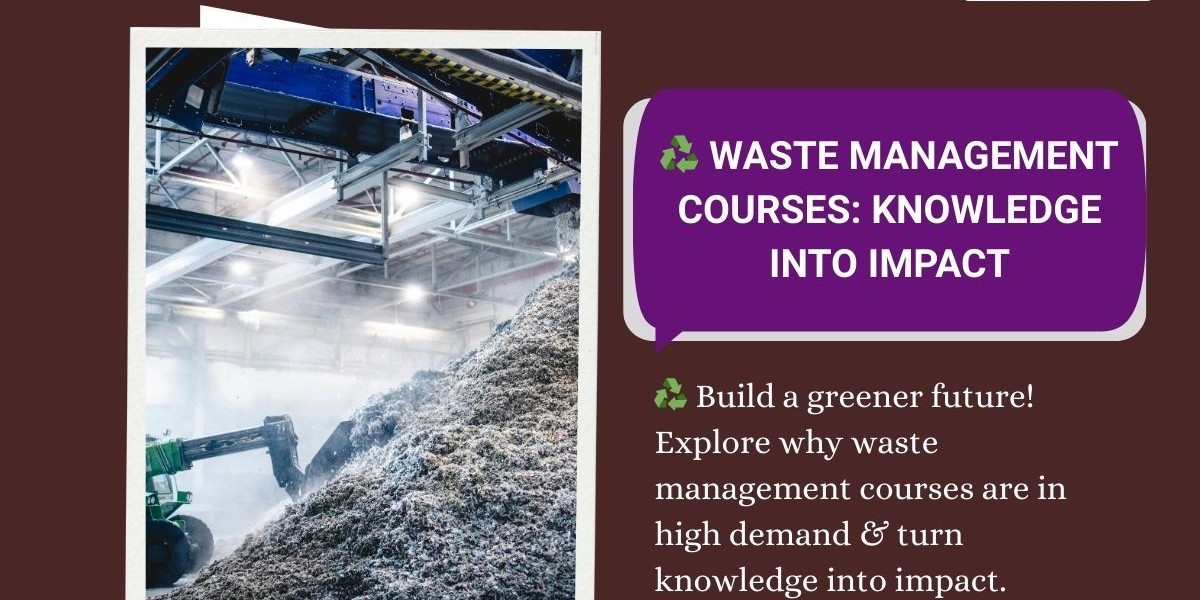Introduction
Waste management is no longer a secondary issue—it is a global priority. With rapid urbanization, industrial growth, and increasing consumerism, the amount of waste produced worldwide has reached alarming levels. This has created a need for professionals who can provide sustainable solutions. That is where waste management courses come into play. These courses equip learners with the right skills, knowledge, and practical expertise to tackle environmental challenges effectively.
Among the leading institutions offering structured programs, the Central Council for Vocational Training and Skill Education (CCVTE) provides career-oriented waste management courses designed to build competence and global impact. By aligning with modern environmental policies, international best practices, and India’s skill development vision, CCVTE ensures students are future-ready.
What Are Waste Management Courses?
Waste management courses are specialized training programs that focus on the systematic handling, processing, recycling, and disposal of waste materials. These courses combine theory with practical applications, helping students understand the science of sustainability, laws governing waste, and the use of modern technology in the sector.
Key learning areas often include:
Solid Waste Management (urban & rural waste)
Hazardous Waste Management (industrial waste, e-waste, medical waste)
Recycling and Resource Recovery
Environmental Law and Policy
Sustainable Development Practices
Climate Change and Global Impact
Importance of Waste Management Courses in the World
The world currently generates 2.01 billion tonnes of solid waste annually, and this is expected to rise to 3.4 billion tonnes by 2050. Without skilled professionals, improper waste handling leads to:
Environmental pollution (air, soil, and water contamination)
Public health risks
Climate change acceleration through greenhouse gases
Resource depletion
By enrolling in waste management courses, individuals can contribute to global solutions such as:
Reducing landfill usage
Promoting recycling and reuse
Creating green jobs
Implementing zero-waste policies
In essence, these courses transform knowledge into global impact by bridging the gap between awareness and action.
Why Choose CCVTE for Waste Management Courses?
The Central Council for Vocational Training and Skill Education (CCVTE) stands out as a leader in vocational and skill-based education. Choosing CCVTE for waste management courses ensures students receive:
Industry-Relevant Curriculum – Courses designed in alignment with environmental policies and industry standards.
Practical Training – Hands-on exposure to modern waste management techniques and tools.
Experienced Faculty – Guidance from experts in environmental sciences and sustainability.
Flexible Learning Options – Online, distance, and blended learning formats.
Recognized Certification – CCVTE certificates boost employability across industries, NGOs, and government organizations.
By choosing CCVTE, students don’t just learn—they gain access to career opportunities and become part of a global movement toward sustainable development.
Read more- What Does a Documentation Executive Do?
Career Opportunities After Waste Management Courses
Graduates of waste management courses can explore diverse career options:
Waste Management Officer
Environmental Consultant
Recycling Plant Manager
Sustainability Analyst
NGO/International Development Roles
Corporate Sustainability Executive
These roles are in high demand across government bodies, private industries, and international organizations like WHO, UNEP, and UNDP.
Waste Management Courses in India and the World
In India, apart from CCVTE, institutions like IGNOU also provide programs related to waste and environment. However, CCVTE’s vocational focus and skill-based approach make it more career-driven. Globally, universities in Europe and the USA offer degree programs in environmental sciences, but short-term vocational waste management courses are gaining more popularity due to job readiness.
The Global Relevance of Waste Management Education
Waste management is linked directly to sustainable development goals (SDGs) such as:
SDG 6: Clean Water and Sanitation
SDG 11: Sustainable Cities and Communities
SDG 12: Responsible Consumption and Production
SDG 13: Climate Action
By pursuing waste management courses, learners actively contribute to these global goals, making their work impactful not just locally but internationally.
Skill Development and Vocational Training
Before we conclude, it is essential to emphasize that skill development vocational training is the backbone of employability. Waste management requires both knowledge and practical skills—ranging from operating recycling equipment to applying environmental laws. CCVTE integrates skill-based modules in all its courses to ensure students are prepared for the real-world challenges of this sector.
Conclusion
Waste management courses are more than just academic programs—they are pathways to creating a cleaner, healthier, and more sustainable planet. By choosing CCVTE (Central Council for Vocational Training and Skill Education), students gain the right blend of knowledge, skills, and global exposure to become leaders in environmental sustainability.
In today’s world, where waste is both a challenge and an opportunity, these courses provide a chance to transform knowledge into global impact.
FAQs
1. What are the 4 types of waste management?
The four main types are:
Landfill – Disposal of waste in designated land areas.
Incineration – Burning waste to reduce volume.
Recycling – Processing waste materials into reusable products.
Composting – Converting organic waste into fertilizer.
2. What is the course of waste management in IGNOU?
IGNOU offers programs like Diploma in Waste Management and Certificate in Solid Waste Treatment Techniques, focusing on theoretical and practical aspects of environmental management.
3. What are the 7 R's of waste management?
The 7 R’s are: Refuse, Reduce, Reuse, Repurpose, Recycle, Rot, and Recover. These principles guide sustainable waste practices.
4. How to become a waste management officer?
To become a waste management officer, you need:
A relevant qualification (such as a waste management course from CCVTE).
Practical training in environmental sciences.
Strong knowledge of environmental laws and waste handling procedures.
Experience through internships or work in municipal/government projects.
5. What is the scope of waste management courses in the future?
With rising concerns about climate change and environmental sustainability, the scope of waste management courses is massive. Professionals can expect opportunities in government projects, private industries, NGOs, and international organizations working toward a zero-waste future.
✅ By enrolling in waste management courses from CCVTE, students not only secure their careers but also contribute toward a sustainable global impact.






